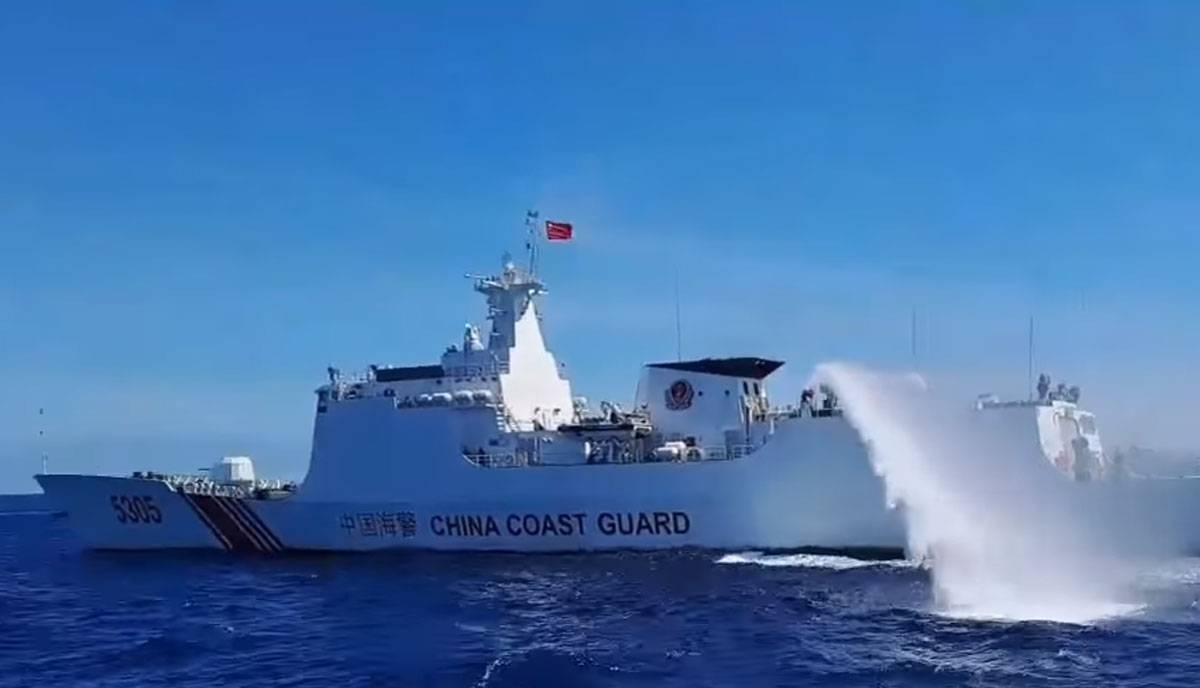US Expresses Concern over Chinese Harassment of Philippine Vessels
The United States has voiced its concern over the repeated harassment of Philippine vessels by Chinese ships near Scarborough Reef (Panatag Shoal), stating that it is “detrimental” to regional peace and stability. In a press briefing, US State Department Deputy Spokesman Vedant Patel called on China to respect the navigational rights and freedoms guaranteed to all states under international law.
The recent incident involved the reported use of water cannons by Chinese coast guard ships on Philippine coast guard and fisheries vessels, causing damage to them. This attack occurred after US Secretary of State Antony Blinken’s visit to China, adding further complexity to the situation.
Patel emphasized that the installation of barriers by the Chinese coast guard endangers the livelihoods of Philippine fisherfolk and prevents them from exercising their legal rights to fish in those waters. These rights were established in a final and legally binding judgment in the Philippines-China arbitration case brought to the 1982 Law of the Sea Convention. Secretary Blinken also reiterated this stance during his travels.
It is important to note that the Permanent Court of Arbitration, based in The Hague, Netherlands, invalidated China’s expansive claim in the South China Sea, which encroached on the Philippines’ exclusive economic zone. However, China’s actions continue to challenge this ruling and create tensions in the region.
Chinese Aggression in the West Philippine Sea
The recent incident involving the China Coast Guard and Chinese maritime militia vessels water cannoning and ramming Philippine Coast Guard and Bureau of Fisheries and Aquatic Resources (BFAR) vessels enroute to Panatag Shoal (Bajo de Masinloc) highlights the ongoing aggression in the West Philippine Sea. These Philippine vessels were on a regular humanitarian mission to provide assistance to Filipino fishermen in the area.
In line with the transparency policy in the West Philippine Sea, the National Task Force for the West Philippine Sea routinely invites members of the press, both local and foreign, to embed in these regular BFAR humanitarian and assistance missions for fisherfolk throughout the West Philippine Sea and the country’s other maritime areas. This allows for greater visibility and documentation of the challenges faced by Filipino fishermen and the efforts made to support them.
The Importance of Upholding International Law
The repeated harassment of Philippine vessels by Chinese ships underscores the need for all nations to uphold international law and respect the rights and freedoms of others. The 1982 Law of the Sea Convention provides a framework for the peaceful resolution of maritime disputes and guarantees navigational rights and freedoms to all states.
China’s actions in the South China Sea, including the installation of barriers and the use of force against Philippine vessels, are not only detrimental to regional peace and stability but also infringe upon the rights of the Philippines and other neighboring countries. The ruling by the Permanent Court of Arbitration in favor of the Philippines’ exclusive economic zone should serve as a reminder of the importance of abiding by international law and respecting the rights of all nations.
Seeking a Peaceful Resolution
In order to achieve lasting peace and stability in the region, it is crucial for all parties involved to engage in dialogue and work towards a peaceful resolution of the disputes. The United States, along with other countries in the international community, has consistently called for the peaceful settlement of maritime disputes in accordance with international law.
Efforts should be made to strengthen regional cooperation and promote confidence-building measures to prevent further escalation of tensions. The involvement of international organizations, such as the United Nations and the Association of Southeast Asian Nations (ASEAN), can also play a significant role in facilitating dialogue and promoting peaceful negotiations.
It is in the interest of all nations to ensure the freedom of navigation and the peaceful use of the seas. By upholding international law and respecting the rights of others, countries can contribute to the maintenance of regional peace and stability in the West Philippine Sea and beyond.







